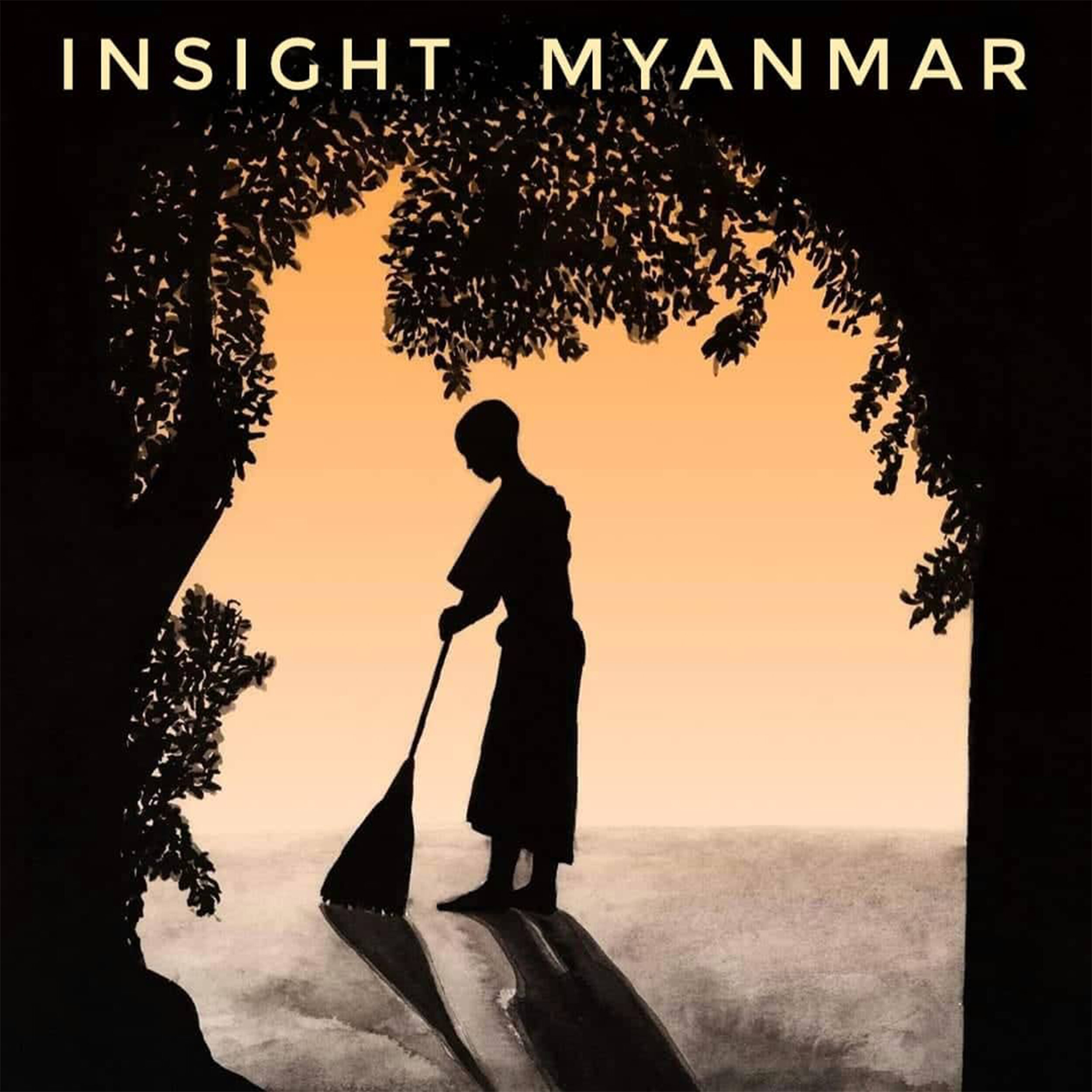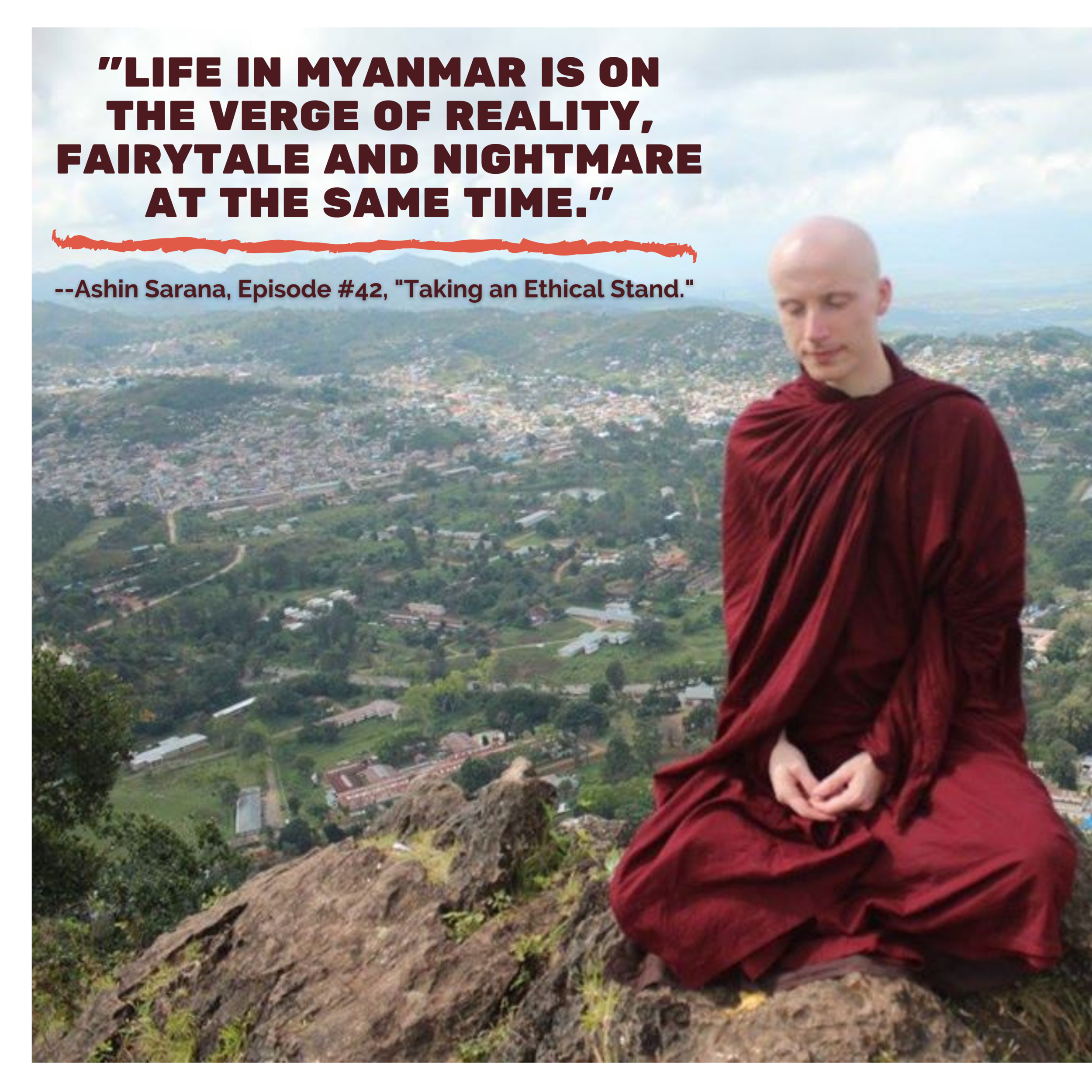A Monk Who is Not Silent
Myanmar is basically a Buddhist country, no matter who the leadership happens to be, so shouldn’t monks and meditators stay out of worldly affairs and just focus on their Dhamma practice, accepting without resistance whatever reality happens to manifest? This is the question I posed to Ashin Sarana, referencing that some meditators are currently espousing these kinds of views, and wondering where he stood on it. After all, U Sarana is a dedicated monastic who so rarely keeps up on the news that years into the Trump presidency, he had no idea that the New York conman had actually ascended the highest office in the land. So perhaps it wouldn’t be unreasonable to think that he was also staying on the sidelines of the current crisis. But nothing could be further from the truth, and U Sarana was positively shocked and horrified to hear that anyone could actually hold this view, as you’ll hear in the excerpt that follows.
“When people have nothing to put into their mouth, they also cannot support monks.”
“We have a chicken farm here close to close to the monastery. And at times, they somehow neglect the cleaning of the chicken feces. Now perhaps I create a disgust in many of those who have made it to this point in the interview and are still listening to us. But, it's as if you took the chicken feces, put it into one cart load, and then threw it on my head! That's how it feels to me to hear this.
I was worrying that somebody could have this kind of belief, but I thought, ‘No living being in the world would ever think like this!” And then when you're reading now, it is like if the worst nightmare ever became a reality.
I believe that this is caused by lack of knowledge about history, because we need to understand the circumstances. So the idea that the military poses no threat to Buddhism, or that is basically that it is the same for the Buddhists whether there's military or whether there's democracy, is a very clear display of lack of knowledge about history, in Myanmar, and in other Buddhist countries as well.
There's a lot of historical knowledge that this person is missing. There are beautiful, detailed articles on 2007 revolution and 1988 revolution in Myanmar, and they contain very important details that show us why the military role is not appreciated.
In 1988, one big thing happened. And it's called poverty. When people have nothing to put into their mouth, they also cannot support monks, and in our scriptures is written that it this is exactly the reason why the Buddha's teachings will disappear! It will disappear when the people have not enough food to eat, and therefore they don't have enough food to support monks. Then because monks are not supported, they will not accept students, and when they don't accept students, they will not teach students and therefore the Buddha’s teaching will gradually disappear. This is exactly what is written in our Pāḷi scriptures. So the poverty caused by the 1988 government were the reasons for people's disappointment.
It's not because people would love to have internet 24 hours, which they don't have. And the person who said this, I suppose has internet 24 hours a day. It's not because not more than five people be allowed to go outside their home, which I'm sure that the person you're talking about is allowed. It's not because the Burmese people would not be allowed to go on go outside of their house, I think after eight or nine o'clock, even alone, which the person you mention certainly is allowed. And again, these are not the reasons for the demonstrations today.
The main reason is that the military will again put people into poverty, and take the people's money for their own purposes.
Another reason is, there's poverty in eating, but there's another kind of poverty, and that is in education. People are very clearly aware how the military has basically destroyed the educational opportunities of the people. The way how people learn today is extremely simple. That's why it's very easy for us to come to Myanmar, speak with the people and find out that their intelligence and their knowledge are much different. This is exactly because the military has decided for this manner of education, the rote learning. Students have to memorize: they're not allowed to think or to question or to ask anything! But also, the military does not support education, military support for education is the least in all of the world in Myanmar. So the education has very little support, and very little financial support from the military government.
So the schools are very poor. Learning is very poor. And the teachers, instead of teaching the children what they know, they ask the children to follow so-called “tuitions,” which are paid. And they're extremely expensive, and if the parents cannot afford to pay the tuitions, which they cannot when they are poor, then the children cannot pass the exam, because the teachers usually will give better mark to somebody who's following tuition. So if the students don't come for the tuition, sorry, they will not get a good mark, they may not pass.
So it’s poverty in food, it's poverty in life, it's poverty in education. So that's why the people don't like it. And that's why it's very important to study on the circumstances of the environment that we are talking about. That's exactly what I'm afraid of, that I will sometimes write or say something that displays of lack of knowledge.”

